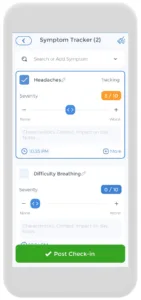
Migraines affect millions of people around the world, causing throbbing pain, sensitivity to light and sound, nausea, and vomiting. Unfortunately, migraine headaches can hurt a person’s life, affecting their professional and personal life. While these symptoms are well-known, some people may experience additional symptoms, such as fever. Not only do these additional symptoms have an extra burden on the person, but they can also sometimes be a cause for concern. In this article, we will explore the connection between migraines and fever and answer the question, Can migraines cause fever? If you are someone experiencing migraines or additional symptoms, keep reading to stay informed and learn what you can do about it!
Understanding Migraines
Migraine is a neurological disorder that affects the nervous system. It is characterized by recurring migraine episodes that can range in intensity and duration. Migraines are often accompanied by other symptoms, including nausea, vomiting, and increased sensitivity to light and sound. While migraine headaches are a common condition, they can be incredibly debilitating and disruptive to daily life.
Common Migraine Symptoms
The symptoms of migraine headaches can vary from person to person, but some of the most common ones include:
- Extremely severe headache: This is the most common symptom of migraines. The headache is often described as a pulsing or throbbing sensation that can be felt on one or both sides of the head. The pain can range from mild to severe and can be exacerbated by physical activity.
- Nausea: Many people with migraine attacks experience nausea, which can be mild or severe. Some people may also experience vomiting, which can exacerbate dehydration and other symptoms
- Sensitivity to light and sound: Migraine attack sufferers may become sensitive to light and sound, making it difficult to work or engage in normal activities. Exposure to bright light or loud noises can exacerbate migraine symptoms, making it important to rest in a quiet, dark room.
- Visual disturbances: Some people experience visual disturbances such as flashing lights, zigzag lines, or blind spots before the onset of a migraine headache. These visual disturbances are known as an “aura” and can be a warning sign that a migraine attack is about to occur.
These symptoms can last for hours or even days, and can be so severe that they interfere with daily activities. You can use the CareClinic app the track the symptoms you experience and ensure that your medical information is regularly recorded and updated.
activities. You can use the CareClinic app the track the symptoms you experience and ensure that your medical information is regularly recorded and updated.
Migraine Triggers and Causes
A chronic migraine can be caused by a range of triggers and risk factors, such as stress, hormonal changes, certain foods, bacterial or viral infection, and environmental factors. For some people, bright lights or loud noises can trigger a migraine, while for others, it may be a particular food or drink. Hormonal changes, such as those that occur during menstruation, can also trigger migraines in some people. Additionally, genetics may play a role in the development of migraines.
It is important to understand your triggers to manage and prevent migraines. Keeping a headache diary can help identify patterns and triggers. Once you have identified your triggers, you can take steps to avoid them. For example, if stress is a trigger, practicing relaxation techniques such as deep breathing or meditation can be helpful. If certain foods trigger your migraines, you can try eliminating them from your diet.
While there is no cure for migraines, there are treatments available to help manage the symptoms. Over-the-counter pain relievers such as ibuprofen or acetaminophen can be effective for mild migraines. For more severe migraines, prescription medications such as triptans or ergotamines may be necessary. In addition to medication, lifestyle changes such as regular exercise, a healthy diet, and adequate sleep can also help reduce the frequency and severity of migraines.[1][2]
The Link Between Migraine and Fever
Can Migraines Cause Fever?
Fever is not typically considered a symptom of migraines. However, some people may experience a low-grade fever during a migraine attack. This may be due to an inflammatory response in the body or the fever occur as a result of the body’s response to the pain and stress of a migraine.
It’s important to note that fever during a migraine attack is not a cause for alarm. It is usually mild and does not indicate a serious underlying condition. However, if you experience a high fever or other symptoms such as confusion, seizures, or difficulty speaking, seek medical attention immediately.
Fever as a Migraine Symptom
Fever is not a common migraine symptom, but it is possible for some individuals to have migraine and fever. In addition to fever, other symptoms of a migraine attack may include:
- Throbbing or pulsating headache
- Nausea and vomiting
- Sensitivity to light and sound
- Blurred visual symptoms
- Feeling lightheaded or dizzy
- Other types of headaches, such as hemiplegic migraine or cluster headache
If you experience any of these symptoms, it’s important to seek medical attention and get an accurate diagnosis.
Bacterial or Viral Infection as an Underlying Illness
In instances where migraine and fever coincide, the underlying cause is often associated with bacterial or viral infections. Bacterial infections are caused by the invasion and multiplication of pathogenic bacteria in the body. The presence of these harmful microorganisms triggers the immune system to mount a defense response, releasing various chemicals and cytokines to combat the infection. This immune response includes the activation of white blood cells, such as macrophages and neutrophils, which release pro-inflammatory substances like interleukins and tumor necrosis factor-alpha.
Viral infections, on the other hand, occur when viruses invade host cells and replicate within them. When viruses infect cells, they hijack the cell’s machinery to produce more viral particles. As a result, the immune system recognizes this intrusion and responds by releasing inflammatory mediators, such as interferons, which help inhibit viral replication and activate immune cells. The release of these immune substances can lead to fever as a protective mechanism.
Inflammatory Responses in Migraines
Research has suggested that migraines are associated with an inflammatory response in the body, which may contribute to the development of chronic migraine and symptoms. Inflammatory markers and cytokines, which are involved in the body’s immune response, are elevated during a migraine attack.
This inflammatory response may be triggered by a variety of factors, including stress, hormonal changes, viral or bacterial infection, and environmental factors such as weather changes or exposure to certain foods or chemicals.
While the exact cause of migraines is still not fully understood, research into the inflammatory response and other potential triggers is ongoing. By better understanding the underlying mechanisms of migraines, researchers hope to develop more effective treatments and preventative measures for this debilitating condition.[3][4]
Differentiating Migraines from Other Conditions
Migraines can be a debilitating condition that affects millions of people worldwide. While they share some symptoms with other conditions, it is important to understand the key differences between migraines and other ailments to ensure proper diagnosis and treatment. Understanding the difference can help you manage whatever you may be dealing with, but more importantly, ensure that there is not something more serious underlying your migraine symptoms.
Migraines vs. Tension Headaches
While migraines and tension headaches can share some symptoms, such as head pain and sensitivity to light and sound, there are some key differences between the two. Tension headaches are typically milder than migraines and do not cause nausea or vomiting. Tension headaches can often be caused by stress or muscle tension and can be treated with over-the-counter pain relievers such as acetaminophen or ibuprofen.
Migraines vs. Sinus Infections
Sinus infections can also cause sinus headaches and facial pain, which can sometimes be mistaken for a migraine. However, sinus infections are typically accompanied by congestion and or sinus pressure. Sinus infections can often be treated with antibiotics, decongestants, and over-the-counter pain relievers.
Migraines vs. Meningitis
Meningitis is a serious condition that affects the lining of the brain and spinal cord. Symptoms of meningitis can include headache disorders, fever, and nausea, which can sometimes be mistaken for a migraine. However, meningitis is typically accompanied by other symptoms such as rash, neck stiffness, confusion, and sensitivity to light. Meningitis requires immediate medical attention and can be treated with antibiotics and other supportive care.
It is important to note that migraines can also have a variety of other symptoms, including sinus headaches, visual disturbances, dizziness, and tingling or numbness in the face or limbs. Migraines can often be triggered by certain foods, environmental factors, or hormonal changes, and can be managed with a combination of lifestyle changes and medication.
If you are experiencing frequent or severe headaches, it is important to consult with a healthcare provider to determine the underlying cause and develop an appropriate treatment plan.[5][6][7][8]
Managing Migraines and Fever
Over-the-Counter Medications
Over-the-counter pain relievers, such as ibuprofen and acetaminophen, can help alleviate mild to![]() moderate migraine pain and reduce fever. However, these medications should not be used regularly or in high doses as they can cause rebound headaches and other side effects.
moderate migraine pain and reduce fever. However, these medications should not be used regularly or in high doses as they can cause rebound headaches and other side effects.
It is important to note that not all over-the-counter medications are safe for everyone. Individuals with certain medical conditions or who are taking other medications should consult with a healthcare provider before taking any new medication.
In addition to pain relievers, over-the-counter anti-nausea medications, such as dimenhydrinate and meclizine, may also be helpful in managing migraines that are accompanied by nausea or vomiting.
Prescription Medications
Prescription medications, such as triptans and ergotamines, can also help alleviate migraine pain and reduce fever. These medications work by targeting the underlying causes of migraines, such as inflammation and blood vessel constriction.
It is important to note that prescription medications may have more serious side effects and should only be taken as directed by a healthcare provider. Additionally, some prescription medications may not be safe for individuals with certain medical conditions or who are taking other medications.
Lifestyle Changes and Home Remedies
While medications can help manage migraines and fever, lifestyle changes and home remedies can also play a role in reducing the frequency and intensity of migraines.
Getting enough sleep, managing stress, and avoiding migraine triggers, such as certain foods or environmental factors, can all help prevent migraines. It may also be helpful to keep a migraine diary to identify triggers and patterns.
In addition to lifestyle changes, home remedies such as applying a cold compress to the head or neck, practicing relaxation techniques such as deep breathing or meditation, and staying hydrated can also provide relief from migraines.
It is important to note that while lifestyle changes and home remedies can help manage migraines, they should not be used as a substitute for medical treatment. Individuals who experience frequent or severe migraines should consult with a healthcare provider to determine the best course of treatment.
When to Seek Medical Help
Migraines are a common neurological condition that can cause severe headaches, nausea, and sensitivity to light and sound. While most migraines are not life-threatening, certain warning signs may indicate a more serious condition.
Warning Signs of a Serious Condition
If you experience any of the following symptoms during a migraine attack, seek emergency medical attention immediately:
- Seizures: Seizures are a serious neurological condition that can cause convulsions and loss of consciousness. If you experience seizures during a migraine attack, seek medical attention immediately.
- Loss of consciousness: If you lose consciousness during a migraine attack, it may be a sign of a more serious condition. Seek medical attention immediately.
- Sudden onset of severe headache: If your headache is sudden and severe, it may be a sign of a more serious condition. Seek medical attention immediately.
- Blurred vision or double vision: If you experience blurred vision or double vision during a migraine attack, it may be a sign of a more serious condition, such as a cancerous tumor in rare cases. Seek a doctor immediately.
- Difficulty speaking or understanding speech: If you have difficulty speaking or understanding speech during a migraine attack, it may be a sign of a more serious condition. Seek medical attention immediately.
Consulting a Healthcare Professional
If you experience frequent or severe migraines, it is important to talk to your healthcare provider. They can help you develop an individualized treatment plan that may include prescription medications, preventative measures, and lifestyle changes.
Your healthcare provider may recommend keeping a headache diary to track your symptoms and identify triggers. This can help them determine the best course of treatment for you.
Preparing for Your Doctor’s Appointment
Before your appointment, make note of your symptoms, triggers, and any medications that you are taking. This information can help your healthcare provider determine the best course of treatment for you.
taking. This information can help your healthcare provider determine the best course of treatment for you.
You may also want to bring a list of questions to ask your healthcare provider. Some questions you may want to ask include:
- What is causing my migraines?
- What are my treatment options?
- What lifestyle changes can I make to reduce the frequency and severity of my migraines?
- What medications are available to treat migraines?
- What are the potential side effects of these medications?
Seeing your doctor can sometimes be overwhelming, and it can be easy to forget to tell your doctor things. However, the Careclinic app can come in useful here, since it allows you to record all your symptoms over time. All you need to do when you see your doctor next time if to pull out your phone, and your symptoms will be ready for your doctor to look over. Whether you had a sore throat, high body temperature, flu-like symptoms, dental abscess, migraine episode, stiff neck, neurologic symptoms, sinus headache, infection, or anything else, you can track it all on the app!
By working closely with your healthcare provider, you can develop an effective treatment plan that can help you manage your migraines and improve your quality of life.[9][10]
Track Your Migraine Symptoms
Having a migraine attack action plan is crucial, and the CareClinic app can help with that. You can use the app as your health and clinical journal. Just go to the migraine diary section of the app and enter your daily symptoms, medications, and other triggers, as they occur. There are also specific sections on the app to track each of these. This can help you be aware of early warning signs. For example, if you have motion sickness, severe migraine attacks, and adverse events may occur more often.
The app also has a medication section where you can precisely track the doses you are taking and receive reminders on when to take each pain medication. We know how difficult but important keeping track of your medications is, so we hope to make it as easy and streamlined as possible. This way, you can take your medications and experience consistent relief.
While fever is not a common symptom of migraines, some people may experience a low-grade fever during a migraine attack. Understanding the links between migraines, fever, and other symptoms can help you better manage your condition. By making lifestyle changes, taking over-the-counter or prescription medications, and seeking medical attention when necessary, you can reduce the frequency and intensity of your migraines and live a fuller, healthier life.[11][12]
References
- “Migraine | National Institute of Neurological Disorders and Stroke”. https://www.ninds.nih.gov/health-information/disorders/migraine
- “Migraine Causes, Symptoms & Treatment | Baptist Health”. https://www.baptisthealth.com/care-services/conditions-treatments/migraine
- “The role of cytokines in migraine: A systematic review – PubMed”. https://pubmed.ncbi.nlm.nih.gov/35962530/
- “Migraine and neuroinflammation: the inflammasome perspective – PMC”. https://pmc.ncbi.nlm.nih.gov/articles/PMC8192049/
- “Types of Headaches | LifeMD”. https://lifemd.com/learn/types-of-headaches
- “Sinus Headaches and Migraines: Symptoms, Causes, and Differences – Orange Coast ENT”. https://www.entdoctoroc.com/blog/sinus-headaches-and-migraines-symptoms-causes-and-differences/
- “Headache: Types, Causes, Treatments”. https://resources.healthgrades.com/right-care/migraine-and-headache/headache
- “Meningitis & Encephalitis Headaches vs. Migraine”. https://migraine.com/headache-types/meningitis-encephalitis-headaches
- “Keeping a headache diary – The Migraine Trust”. https://migrainetrust.org/live-with-migraine/self-management/keeping-a-migraine-diary/
- “Keeping a headache diary – Harvard Health”. https://www.health.harvard.edu/headache/keeping-a-headache-diary
- “Migraine Buddy: Track Headache on the App Store”. https://apps.apple.com/us/app/migraine-buddy-track-headache/id975074413
- “Increase in body temperature during migraine attacks – PubMed”. https://pubmed.ncbi.nlm.nih.gov/23710707/


